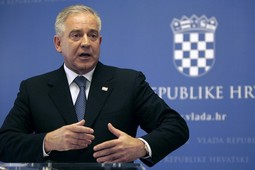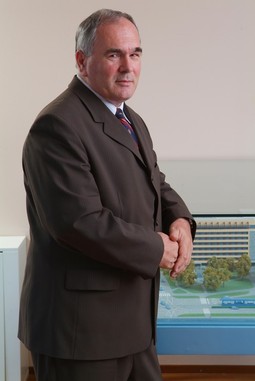DAMIR BEGOVIC His arrival at the helm of the company that runs TLM opened the way to speculation concerning how much the transfer was influenced by his mandateThe ever more frequent write-up's in the press about the shoddy management at the national electric power company are a reflection of a massive struggle for power at the largest state-owned firm. With the departure of Ivo Sanader, powerful figures within the HDZ have decided to take power in HEP (Hrvatska elektroprivreda), the national electric power company, as quickly as possible and to prepare it for privatisation. The first step in this plan is to publicly discredit and then sack Ivan Mravak, the top man as the company and the chief opponent of the idea to privatise the national energy company.
And that is precisely why Mravak is to be succeeded by Damir Begovic, the former HEP CEO, known otherwise as one of the advocates of the company's privatisation and a lobbyist in Croatia for many years for the German energy firm RWE. Besides Begovic, the key role in the company's future operations would also be played by Kresimir Cosic, a HDZ Member of Parliament and a current member of the HEP Supervisory Board. Nacional has learned this from people close to top Government officials, and according to the information, Begovic and Cosic are the chief proponents of the HDZ fraction that has exerted great pressure on Prime Minister Jadranka Kosor these last weeks to launch the procedure to dismiss Mravak.
Jadranka Kosor, however, refused to do so, saying that she would sack Mravak only if an investigation into HEP operations being led by USKOK shows that he was involved in illegal activity. In this way, at least for the time being, the plan that was to have seen Cosic and Begovic, otherwise close friends, get the chance to manage the process of privatising HEP, a billion euro job, has been thwarted. But the chief obstacle to the realisation of these ambitions remains Mravak, who has since coming to the helm of the company in 2003 been expressly against the idea that HEP be sold off to one of the big foreign energy companies. During his six years at the top spot in HEP, Mravak apparently enjoyed the firm support of former Prime Minister Ivo Sanader. This is not surprising as the top man at HEP and the Prime Minister worked very closely on several occasions, especially as regards the price of electrical energy in Croatia. In 2007 and 2008 Sanader on several occasions asked HEP to back down from plans to increase the price of electrical energy, fearing the negative public backlash. Mravak took his requests into consideration, and HEP sold electric energy significantly under market prices for more than two and a half years. The result of this was a balance sheet in very poor shape, the usually big profits of the company evaporating during those years, and HEP operating on the brink of profitability. And while this was a practice detrimental to the firm, Mravak justified it with the fact that he could not ignore the will of the majority owner.
Nevertheless, during those lean years there was little mention of HEP in the domestic media. Articles on problems in the business began to appear only this year, with the issue intensifying only over the last two months, after Sanader tendered his resignation. Mravak was accused of an entire series of improprieties, from alleged embezzlement when buying up electrical energy, the fact that he raised his own pay significantly at the height of the recession, to accusations that he employed a number of unqualified party-political cronies at HEP. It was then that the first doubts emerged that these media write-ups were part of a massive power struggle within the company itself. Most of the documents that appeared in the domestic media, namely, and which allegedly prove criminal activity by a part of the management, were only available to a small number of top HEP officials, such as the members of the Board of Directors and Supervisory Board. Since members of the ruling coalition hold almost all of the posts in these boards, it is not hard to conclude that the media scandal surrounding HEP has a significant political background. These suspicions were further strengthened when some of the press began speculating with the name of Damir Begovic, a close friend of HEP Supervisory Board member Kresimir Cosic, as Mravak's possible successor. But the idea that Begovic could, with the support of Cosic, succeed Mravak is a quite strange one, considering that they also played significant roles in the scandals cited as reasons to sack the number one man at HEP.
DURING HIS SIX YEARS IN POWER former Prime Minister Ivo Sanader allegedly gave his firm support to Ivan Mravak as the HEP CEOThe first scandal concerns contracts on the basis of which HEP sold electricity to TLM and the Mostar Aluminium Factory at four times under cost. Mravak was admonished by the press for using taxpayer money to subsidise private businesses in Croatia and Bosnia & Herzegovina. But there is no less responsibility borne for this practice by Kresimir Cosic who, besides his post at the HEP Supervisory Board, holds the same post in the TLM Supervisory Board. Based on these two posts he was twice in a position to learn of these contracts, had two opportunities to stop them, but failed to do so. Damir Begovic, on the other hand, as the top man at TLM, took a direct part in drafting the contracts whereby TLM purchased electricity from HEP under cost, and then subsequently sent it on to the Mostar Aluminium Factory under the same conditions. Both, then, were active participants in the process of creating these contracts, and therefore bear a part of the responsibility for their negative effects. And Kresimir Cosic is also quite compromised in another scandal Mravak is accused of. This one concerns contracts to purchase electrical energy that HEP concluded with the EFT, Rudnap and Korlea companies. The Vecernji list daily claimed that, by paying unrealistically high prices, HEP through these contracts lost about 750 million kuna in a year. The authorised representative of the joint Ukrainian-Slovakian Korlea company in Croatia is in fact Kresimir Cosic's son Marko Cosic. In 2008 alone this company sold HEP electricity worth 72.9 million euro. This is a blatant example of a conflict of interest, as it puts Cosic, a Supervisory Board member, practically in a position to approve contracts HEP signs with the company his son works for.
If these contracts are indeed detrimental to HEP, as the press claims they are, this conflict of interest on the part of Cosic could be characterised as a crime. On the other hand, given that Korlea is registered as a supplier of electrical energy in Croatia, those in the know see yet another potential conflict of interest on the part of Cosic. Experts, namely, feel that the privatisation of HEP would result in a 20 to 30 percent hike in the price of electrical energy in Croatia. At that price all alternative suppliers, like Korlea, would be able to compete with HEP and develop their operations in this segment. It is here precisely that Nacional's sources see one of the chief reasons why Cosic favours the privatisation of HEP. The fact that he has succeeded in securing strong political support for the initiative comes as no wonder, as he has for years been considered one of the most influential members of the so-called Herzegovinian fraction within the HDZ. Cosic, a native of Zagreb, became a member of this fraction back in the early 1990s when then Defence Minister Gojko Susak installed him as one of his deputies. He soon thereafter became a general, regardless of the fact that he never took part in active combat. He stayed on at the post of Deputy Minister during the terms in office of Andrija Hebrang and Pavao Miljavac, and has remained on especially good terms with Hebrang, who is considered his chief political ally. When the HDZ wound up in the opposition, Cosic became a Member of Parliament, and with the rise of Sanader to the helm of the party his political influence began to increase.
The reason for this was Cosic's very high standing among HDZ sympathisers in the Diaspora, and Sanader worked through him to reduce the influence of Florijan Boras and Zdenka Babic-Petricevic, whose frequently homophobic and nationalist statements undermined the European image Sanader was looking to affirm. Cosic was very successful in this regard, and the feeling is that this was one of the reasons he was entrusted with the post on the HEP Supervisory Board, one of the most important state-owned firms. And while he has largely limited his public activity to his political career and his scholastic career at the University of Zagreb's Faculty of Electrical Engineering and Computing, Cosic was a few years ago faced with accusations that he had helped Borislav Skegro in the process of lobbying that the Swedish-based Tele2 win the tender for the third mobile telephony concession. These allegations have never been proven, but it is a fact that Cosic nowadays has excellent relations with a whole spate of former influential members of the HDZ. One of these is Damir Begovic, who was during the reign of former President Franjo Tudjman considered the most powerful of the managers of state-owned firms in Croatia. Just the fact alone that he spent seven years, from 1993 to 2000, at the helm of HEP, bears witness to the fact that Begovic was exceptionally skilled in plying the political waters of the time. Some HEP employees claim to this day that Begovic had frequently been at odds with the political leadership of the time, even with former President Tudjman, and that he three times avoided his already agreed-upon sacking.
IVAN MRAVAK The HEP CEO has now come under severe press fire for allegedly poor management of the companyMany to this day feel that the support of the Church proved key to Begovic, support he gained through his marriage to the daughter of Lav Znidaric, Croatia's most prominent post World War II Catholic layman, who was frequently at odds with the authorities of the former Yugoslavia. As far as Begovic's first term at HEP is concerned, there is no consensus on the evaluation of his success. In demanding times he launched several very important projects and contributed to the consolidation and stabilisation of the Croatian electric power supply network. On the other hand, he is criticised for making some very detrimental moves, like the fact that he left his successor at the head of HEP, Ivo Ovic, losses of almost 700 million kuna, an exceedingly unfavourable contract on the construction of the Jertovec thermal power plant and the purchase of electrical energy he concluded with the failed US company Enron. On orders from top political leaders, Begovic signed a contact on the construction of a 240-megawatt natural gas-fired thermal power plant, with the entire project estimated at about 1.2 billion dollars. The key parts of the contract were not then made public, that being Croatia's obligation to buy electricity from Jertovec as prices that were to have been set by the Americans. Later, following lengthy negotiations, the Government of Ivica Racan did, in the end, succeed in cancelling the contract. After having been sacked as HEP CEO in 2000, Begovic continued to work as a private businessman and consultant in Croatia to a large German energy company, RWE.
As far back as in 2002 he told the Croatian press that the German company would assume the supply of some large consumers from HEP. It is precisely his ties to the German company that many feel disqualify him from the possibility of coming to the helm of HEP and leading its privatisation, especially since RWE would almost certainly be one of the chief candidates to buy the Croatian company. Begovic's life as a private businessman was not a lengthy one. By the end of 2003, with the HDZ's return to power, he was appointed to the HEP Supervisory Board, a post he quit just a few months later. Behind the scenes it was then said that Begovic had left the post after a major row with the then newly-appointed CEO Ivan Mravak. Begovic got another job at a state owned company in mid 2005 when he was appointed to the helm of the Sisacka zeljezara steelworks after Russia's Mecelj pulled out of its ownership stake because of financial difficulties. The new board, led by Begovic, had to carry out a new privatisation of the company, and Begovic was accused of having favoured the Slovakian-based Zeljeziarne Podbrezova and its owner Vladimir Sotak. According to this information, on which Nacional then reported, Begovic allowed the Slovakian company to carry out due diligence of the steelwork's operations months ahead of the other competitors by way of an agreement on operational collaboration with one of the Slovakian firm's daughter companies, and the final contract concluded with Zeljeziarne Podbrezova gave the Slovakians no obligations to invest in modernising production or retaining employees. The allegations of Begovic's negligence were never, however, investigated.
Halfway through last year he was appointed the CEO of Adrial Plus, the company that manages Sibenik's TLM, which had just been purchased by a consortium of Croatian companies including Dalekovod, Konstruktor, Zagreb-Montaza, Alu Flex Pack and Feal of Siroki Brijeg. Begovic's arrival at the post was seen as a surprise among experts, in spite of the fact that as the HEP CEO in the 1990s he played the key role in transactions whereby HEP converted TLM's debt for electricity into the company's stock. It was said then that his tenure in the Sibenik-based firm would run only six months, the amount of time he needed to carry out the restructuring of the company and divide it into three separate units. The term did, however, last longer, and given the uncovered contracts between TLM and HEP, the question that arises is whether Begovic's knowledge of the situation at HEP and his influence there where not in fact the chief reason for his coming into the top position in Sibenik. These indications are stronger still after the allegations that were levelled at him recently in the Slobodna Dalmacija daily, which claim that Begovic earns a wage of 6 thousand euro a month, even though he only spends two days a week in Sibenik, and the rest on official trips to Zagreb. In this context it can be assumed that Begovic is interested in returning to the helm of HEP. He is evidently backed in this regard by some people within the HDZ, and it can be expected that the pressure on the Prime Minister to sack Ivan Mravak will strengthen in the future. If that does happen, the next step could be to prepare HEP for privatisation. Begovic has gained privatisation experience working at the Sisak steelworks, and even though he has been saying of late that the sale of HEP can be avoided, those in the know say that he is surely no opponent of the idea. The initiative is, on the other hand, not currently particularly popular among top Government officials, but if the economic crisis continues the idea of a billion euros pouring into the national budget with the sale of a 35 percent stake in HEP will become a much more appealing one to the Prime Minister and her team. On the long term, though, a billion euro is a quite poor argument for the sale of the only valuable company still in the state's portfolio.
The move would almost certainly lead to higher electricity costs in Croatia, the living standard would drop, the domestic economy become even less competitive, and Croatia would have even less opportunity to lead an independent energy policy. It is then quite clear that there is no general community interest in seeing the national energy company privatised, while there can be only speculation for the moment as to the private interests of some individuals.
Prime Minister Jadranka Kosor backs Ivan Mravak
■ Damir Begovic and Kresimir Cosic are the chief proponents of the HDZ fraction that has these past weeks exerted strong pressure on Prime Minister Jadranka Kosor to launch the procedure to dismiss HEP CEO Ivan Mravak, Nacional has learned from sources close to Government. Jadranka Kosor, however, refused to sack Mravak, saying that she would do so only if an investigation of HEP operations being carried out by USKOK reveals that he was involved in illegal activity. In this way, at least for the time being, the plan that was to have seen Cosic and Begovic, otherwise close friends, get the chance to manage the process of privatising HEP, a billion euro job, has been thwarted.







